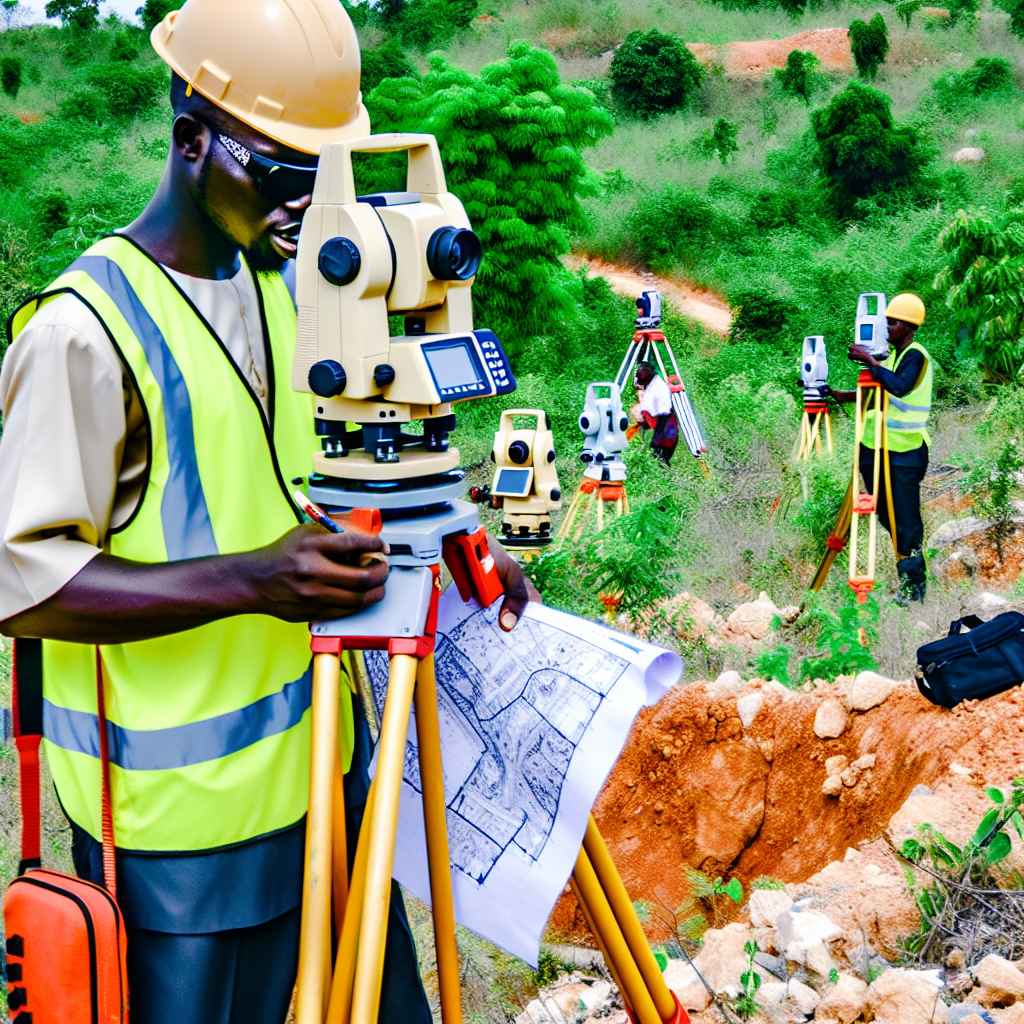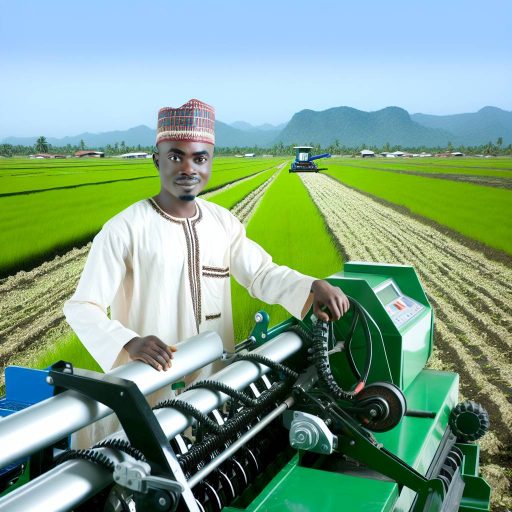Introduction:
Brief overview of land surveying tools and technologies in Nigeria
In Nigeria, land surveying tools and technologies have evolved significantly in recent years.
Modern equipment such as GPS systems, drones, and GIS software is now in use.
Importance of accurate land surveying in various industries
Accurate land surveying plays a crucial role in various industries in Nigeria.
These industries include real estate, construction, urban planning, and infrastructure development.
It ensures proper land demarcation, boundary determination, and site mapping.
These aspects are essential for successful project execution.
Traditional land surveying tools in Nigeria:
Examples of traditional tools used in land surveying:
- Chains: Used for linear measurements over short distances.
- Compass: Helps in determining directions on the survey site.
- Theodolite: Used for measuring horizontal and vertical angles.
- Level: Ensures a level surface for accurate measurements.
- Plumb Bob: Used to establish a vertical reference line.
Advantages of traditional tools:
- Cost-effective and readily available in local markets.
- Can be used in remote areas without access to modern technology.
- Require minimal training for proficient use by surveyors.
- Simple to maintain and repair, reducing downtime during surveys.
- Well-suited for small-scale projects with limited budgets.
Limitations of traditional tools:
- Limited accuracy compared to modern surveying instruments.
- Time-consuming process due to manual measurements and calculations.
- Susceptible to errors caused by human factors and environmental conditions.
- Not suitable for large-scale projects that require high precision.
- Lack of advanced features for data analysis and integration.
Modern land surveying instruments:
Land surveying in Nigeria has seen significant advancements in recent years.
Thanks to the introduction of modern technologies and tools.
These tools have revolutionized the way land surveying is conducted.
Making the process more accurate, efficient, and reliable.
In this section, we will explore two key modern land surveying instruments that are widely used in Nigeria:
GPS technology and its impact on land surveying in Nigeria
Global Positioning System (GPS) technology has had a profound impact on land surveying in Nigeria.
GPS uses a network of satellites to determine the precise location of a point on the earth’s surface.
This technology has drastically improved the accuracy and efficiency of land surveying in the country.
- GPS technology allows surveyors to accurately determine the coordinates of a point on the ground.
- Enabling them to create detailed maps and plans with high levels of precision.
- By using GPS technology, surveyors can quickly and efficiently measure large areas of land.
- Reducing the time and resources required for surveying projects.
- GPS technology has also improved the safety of land surveyors in Nigeria.
- As it allows them to conduct surveys in remote or dangerous areas.
- Without putting themselves at risk.
- Furthermore, GPS technology has made it easier for surveyors to collaborate and share data.
- Leading to more integrated and comprehensive land management practices in Nigeria.
Laser scanning and drone technology in land surveying
Laser scanning and drone technology are two innovative tools that have gained popularity in land surveying in Nigeria.
These technologies allow surveyors to collect detailed, accurate, and high-quality data quickly and efficiently.
- Laser scanning technology uses a laser beam to measure distances and create 3D models of the land surface.
- Providing surveyors with precise and detailed information about the terrain.
- Drone technology, on the other hand, uses unmanned aerial vehicles (UAVs) to capture aerial images and videos of the land.
- Allowing surveyors to create detailed maps and models with high levels of accuracy.
- Both laser scanning and drone technology have significantly improved the speed and efficiency of land surveying projects in Nigeria.
- Reducing the time and resources required for data collection and analysis.
- These technologies also provide surveyors with a safer and more cost-effective way to gather data.
- Especially in hard-to-reach or hazardous areas.
- Ensuring that land surveying projects in Nigeria are conducted with maximum efficiency and accuracy.
The introduction of modern land surveying instruments such as GPS technology, laser scanning, and drone technology has greatly improved the practice of land surveying in Nigeria.
These tools have enhanced the accuracy, efficiency, and safety of surveying projects.
Leading to more comprehensive and integrated land management practices in the country.
Learn More: Surveying Data Management and GIS Software
Use of Geographic Information System (GIS) in land surveying:
In recent years, the use of Geographic Information System (GIS) technology in land surveying has become increasingly popular in Nigeria.
GIS is a powerful tool that allows surveyors to map, analyze, and visualize spatial data with precision and accuracy.
Benefits of GIS in mapping and analyzing land data:
- GIS enables surveyors to create detailed maps of land parcels, boundaries, and topographical features.
- With GIS, surveyors can overlay different layers of data to identify patterns and relationships, helping in decision-making.
- GIS allows for the integration of data from various sources, such as satellite imagery, GPS data, and ground surveys.
- By using GIS software, surveyors can analyze land data more efficiently and accurately, reducing errors in measurements.
- GIS can aid in monitoring land use changes over time, helping to assess the impact of development projects on the environment.
Integration of GIS with other surveying tools for accurate results:
- GIS software can be integrated with Global Positioning System (GPS) devices for precise location data.
- Combining GIS with remote sensing technology allows surveyors to capture and analyze data from a distance.
- Using GIS in conjunction with drones can provide high-resolution aerial images for detailed land surveys.
- Surveying equipment like total stations and laser scanners can be connected to GIS software for real-time data collection and processing.
- Integrating GIS with Building Information Modeling (BIM) technology enables surveyors to create 3D models of buildings and structures.
The use of Geographic Information System (GIS) in land surveying offers numerous benefits, such as improved mapping accuracy, data analysis capabilities, and integration with other surveying tools.
By harnessing the power of GIS technology, surveyors in Nigeria can enhance their workflows and deliver more precise and reliable results in various land surveying projects.
Discover More: Role of Land Surveying in Environmental Impact Studies
Challenges faced in adopting new technologies in land surveying:
Adopting new technologies in land surveying comes with its fair share of challenges.
One of the main obstacles is the cost implications associated with acquiring modern surveying tools.
Modern surveying equipment can be quite expensive, making it difficult for many surveyors in Nigeria to invest in these tools.
The initial cost of purchasing these instruments, as well as the maintenance and training costs, can be prohibitive for smaller surveying firms.
Another challenge is the lack of skilled professionals to operate advanced instruments.
While the younger generation of surveyors may be more familiar with technology, there is still a gap in expertise when it comes to operating complex surveying tools.
Training programs and workshops are essential to bridge this skills gap and ensure that surveyors are proficient in using modern equipment.
However, these programs can be costly, and not all surveyors have access to them.
Additionally, the rapid pace of technological advancements in the field of land surveying means that professionals must continually update their skills to keep up with new tools and software.
This ongoing training can be a significant investment of time and resources.
Overall, while the benefits of adopting new technologies in land surveying are clear, there are several challenges that must be addressed to ensure a smooth transition to modern tools and techniques.
- Cost implications of acquiring modern surveying tools
- Lack of skilled professionals to operate advanced instruments
Uncover the Details: Influence of Climate on Nigerian Architectural Designs
Government regulations and policies regarding land surveying tools:
When it comes to land surveying tools and technologies in Nigeria, government regulations play a crucial role in ensuring accuracy and standardization.
It is essential for surveyors to comply with national standards and regulations to maintain the integrity of survey data.
Transform Your Career with Expert Guidance
Get personalized mentorship consulting that’s tailored to your unique path. Our expert advice is actionable and exclusive.
Get StartedCompliance with national standards and regulations:
Surveyors in Nigeria are required to adhere to the standards set by the Surveyors Council of Nigeria (SURCON).
These standards cover various aspects of land surveying, including measurements, mapping techniques, and the use of surveying tools.
It is mandatory for surveyors to obtain a practicing license from SURCON to ensure they are qualified and capable of carrying out surveys accurately and professionally.
This license serves as proof of compliance with national standards and regulations.
Role of government agencies in promoting the use of modern technologies in surveying:
Government agencies in Nigeria, such as the Federal Ministry of Lands and Housing, play a significant role in promoting the adoption of modern technologies in surveying.
These agencies provide training, workshops, and technical support to surveyors to encourage the use of advanced tools and techniques.
By embracing modern technologies like GPS, GIS, and remote sensing, surveyors can improve the efficiency and accuracy of their work.
This, in turn, leads to more reliable survey data that can be used for various land-related purposes, such as urban planning, infrastructure development, and cadastral mapping.
The government also collaborates with industry stakeholders and international organizations to stay updated on the latest trends and advancements in surveying technology.
This ensures that Nigerian surveyors have access to the most innovative tools and techniques available in the market.
Government regulations and policies play a vital role in shaping the landscape of land surveying tools and technologies in Nigeria.
By complying with national standards and regulations and leveraging the support of government agencies, surveyors can enhance their capabilities and contribute to the sustainable development of the nation’s land resources.
Uncover the Details: Famous Nigerian Architects and Their Iconic Works

Impact of Technological Advancements on Land Surveying Practices:
- Increased efficiency and accuracy in land measurements
- Reduction in surveying time and cost with the use of modern tools
Technological Advancements in Land Surveying Tools and Technologies in Nigeria
Land surveying in Nigeria has seen significant advancements over the years.
Especially with the introduction of modern tools and technologies.
These advancements have had a profound impact on land surveying practices in the country.
Increased Efficiency and Accuracy in Land Measurements
One of the key benefits of technological advancements in land surveying tools is the increased efficiency and accuracy in land measurements.
Traditional methods of land surveying were manual and time-consuming.
This often led to errors in measurements.
With the introduction of modern tools such as Global Positioning Systems (GPS) and Geographic Information Systems (GIS), land surveyors in Nigeria are now able to obtain more precise measurements in a shorter amount of time.
GPS technology, in particular, allows surveyors to accurately determine the coordinates of specific points on the land.
This leads to more accurate boundary demarcations and land mapping.
Reduction in Surveying Time and Cost with the Use of Modern Tools
Another significant impact of technological advancements in land surveying is the reduction in surveying time and cost.
Traditional surveying methods required a significant amount of time and resources to complete a project.
This resulted in high costs for both surveyors and clients.
With the use of modern tools such as drones and laser scanning technology, surveyors in Nigeria can now complete surveys in a fraction of the time it would take using traditional methods.
Drones, for example, can quickly capture aerial images of large areas of land.
This allows surveyors to gather data more efficiently and effectively.
In addition to saving time, the use of modern tools has also helped reduce costs associated with land surveying projects.
Surveyors no longer need to invest in expensive equipment or spend hours manually collecting data.
This cost-saving benefit has made land surveying more accessible to a wider range of clients in Nigeria.
Technological Revolution in Land Surveying
Technological advancements in land surveying tools and technologies have revolutionized the way surveys are conducted in Nigeria.
The increased efficiency, accuracy, and cost-effectiveness of modern tools have greatly improved land surveying practices in the country.
Collaboration with international organizations for technology transfer:
International collaboration is vital in advancing land surveying tools and technologies in Nigeria.
By partnering with global surveying companies, local surveyors can benefit from knowledge exchange and the transfer of cutting-edge technologies.
One of the key ways in which Nigeria can leverage international partnerships is through training programs and workshops.
By organizing such events, local surveyors can enhance their skills in using new tools and technologies that are being introduced by international organizations.
These training programs and workshops can cover a wide range of topics, including the latest advancements in GPS technology, drone surveying techniques, and geospatial data analysis.
By gaining hands-on experience with these tools, Nigerian surveyors can improve the accuracy and efficiency of their work.
Additionally, these collaborations can help Nigerian surveyors stay up-to-date with the latest trends and best practices in the field.
As technology continues to evolve rapidly, it is essential for local surveyors to continuously enhance their skills and knowledge in order to remain competitive.
Moreover, partnerships with global surveying companies can also lead to the exchange of ideas and experiences.
By working closely with international organizations, Nigerian surveyors can learn from their counterparts in other countries and adapt their techniques to suit the local context.
Collaboration with international organizations for technology transfer is crucial for the advancement of land surveying tools and technologies in Nigeria.
By embracing these partnerships and investing in training programs, Nigerian surveyors can enhance their capabilities and contribute to the development of the country’s surveying sector.
- Partnerships with global surveying companies for knowledge exchange
- Training programs and workshops organized for local surveyors to enhance skills in using new tools
Future trends in land surveying tools and technologies in Nigeria:
Predictions on the evolution of surveying instruments in the coming years
Potential innovations that could revolutionize the field of land surveying in Nigeria
Predictions on the evolution of surveying instruments in the coming years
With the rapid advancement of technology, the future of land surveying tools in Nigeria looks promising.
Improved accuracy: Surveying instruments will continue to evolve to provide even more precise measurements.
Enhanced automation: There will be a shift towards automation in land surveying processes to increase efficiency.
Integration of geospatial data: Surveying tools will integrate seamlessly with geospatial data for comprehensive analysis.
Real-time data collection: Future instruments will enable real-time data collection and analysis for quicker decision-making.
Potential innovations that could revolutionize the field of land surveying in Nigeria
Drone technology: Drones can revolutionize land surveying by providing aerial images for mapping and data collection.
LiDAR technology: Light Detection and Ranging (LiDAR) can enhance topographic mapping and terrain analysis.
Artificial intelligence: AI can optimize survey data analysis and streamline the surveying process for increased efficiency.
Augmented reality: AR can overlay survey data onto the real world, making it easier for surveyors to visualize information.
Importance of Advanced Tools in Land Surveying
Recap of the importance of using advanced tools in land surveying: Utilizing modern survey technologies improves accuracy and efficiency.
Call to action for government and private sector to invest in modern surveying technologies for sustainable development: It is crucial for both the government and private sector to prioritize the investment in advanced land surveying tools to foster sustainable development in Nigeria.
Additional Resources
Zainab Saka – Civil Engineering – Jacobs | LinkedIn
(PDF) Utilization Of Drones as A Tool For Monitoring Progress In …




